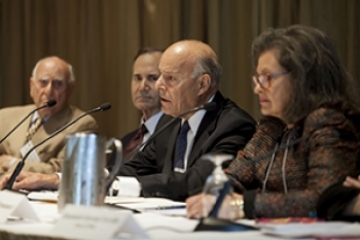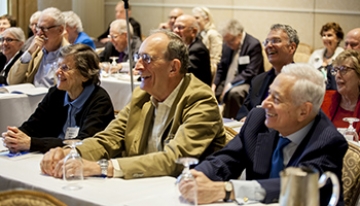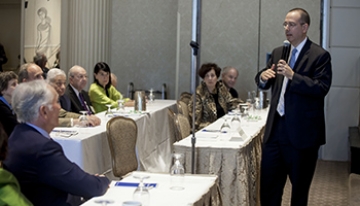50 Years Later—Reflections on Our Columbia Law Education and Experiences Practicing Outside the Mainstream
Alumni from the Class of 1964 Reflect on Their Careers
Elizabeth Giavani Verville ’64 helped negotiate the maritime boundary between Russia and the United States. Susan B. Lindenauer ’64 got a running start at a major law firm and went on to lead the largest legal services provider in the world. Michael R. Griffinger ’64 helped direct his firm’s pro bono efforts toward representing inmates at Guantánamo Bay. And Freddie Gershon ’64 made a career out of protecting the “invisible” intellectual property rights of artists, carving out time to write a novel and finance a musical.
Each of these distinguished alumni shared their thoughts on how Columbia Law School helped shape their careers at the 50th Reunion and Stone Circle Discussion “50 Years Later: Reflections on Our Columbia Law Education and Experiences Practicing Outside the Mainstream.” The June 6 panel kicked off myriad educational, cultural, and social activities offered during Reunion 2014 and was moderated by Senior U.S. District Judge Jack B. Weinstein ’48. The discussion featured commentary from Verville, Lindenauer, Griffinger, and Gershon, as well as remarks on the state of the Law School from Dean David M. Schizer.
“Any of you could be on this platform,” Weinstein told the dozens of Stone Circle members—alumni who graduated 50 or more years ago—who attended the discussion at the Waldorf Astoria in Manhattan, before going on to describe his own career path: serving in World War II, attending night school, and working on the docks prior to enrolling at Columbia Law School.
“I’d never seen a lawyer before, and the first lawyer I saw was Herbert Wexler,” the late 1931 graduate and constitutional law professor who passed away in 2000, Weinstein said. “There was Wexler exercising the Socratic method. After 10 minutes of that, I was ready to go back to the war.”
Instead, Weinstein stuck it out in the classroom, going on to become one of Columbia Law School’s most beloved professors and distinguished alumni and a respected federal court judge.
Weinstein invited the panelists to reflect on their own unique career paths, describing each of them as “driven with a passion to use the tools supplied by the Law School and the law in the public wheel.”
Gershon said working during his first summer at The Legal Aid Society changed his life.
“It gave me the sense that I was a shepherd and I had a flock of people I could help,” he said. “I felt energized. I never looked at my watch to see what time it was.”
Ultimately—after interviewing at several law firms who mistakenly conflated his title as “Editor-in-Chief” of the Law Revue (a student-run sketch comedy show) with that of “Editor-in-Chief” of the Columbia Law Review (a prestigious legal journal)—Gershon went on to build a career in intellectual property law, helping protect what an early boss called artists’ “invisible rights.”
Looking back at her time as a student, Lindenauer said Columbia Law School’s faculty provided a “great intellectual experience.” She noted professors Jack Greenberg and Michael I. Sovern, who continue to teach and inspire students, and credited Weinstein with inspiring her love for procedure and evidence. After developing her lawyering skills at a major law firm, Lindenauer became a poverty law lawyer and eventually took the helm of The Legal Aid Society as general counsel.
Meanwhile, Verville used her Columbia Law School education to pursue her passion for international law. After working in the Massachusetts attorney general’s office, she took a position at U.S. Department of State in the Office of the Legal Adviser.
“It was my dream job—combining the law with international affairs,” she said.
Verville helped negotiate the United States Air Force’s withdrawal from Libya shortly after General Muammar Gaddafi decided not to honor a long-term base agreement.
“Columbia Law School gave us such a good foundation that allowed each of us to launch very different careers,” she said. “I’m grateful that I learned how to think like a lawyer, which made it all possible.”
Like many Columbia Law School graduates, Griffinger combined a successful private practice career with a strong commitment to pro bono public interest work. Two years after he joined his firm, he helped arrange the release of citizens who had participated in the 1967 Newark riots.
“That really struck a chord with me,” he said. “We went on to do a lot of pro bono work, and that’s what I’m most proud of.”
Griffinger’s firm has since established two-year fellowships for law school graduates who want to work in the public interest, was instrumental in the abolishment of the death penalty in New Jersey, and helped rally trial attorneys to represent inmates at Guantánamo Bay.
After the panelists spoke, Weinstein welcomed Dean Schizer to the podium to update the crowd on the state of the Law School.
Dean Schizer said the panelists had done an excellent job demonstrating the Law School’s mission “to train lawyers for every sector that’s important in the world.” He also outlined changes the Law School has made, especially in the last 10 years of his service as dean, including “an absolute firm commitment to encouraging people to go into public interest law.”
Columbia Law School offers one of the most generous Loan Repayment Assistance Programs in the world, provides guaranteed summer funding for students who want to work in public interest or government jobs, and extends fellowships to graduates who have been precluded from permanent positions in the public interest because of hiring freezes or budget cuts.
“We want to be sure students have every incentive to pursue those jobs if that’s what they want to do,” Dean Schizer said.
The dean also spoke about curricular changes he’s made, especially in the second and third years.
“I’m a big fan of the traditional first-year curriculum for the first year,” Dean Schizer said. “But if we do that again in the second and third years, it’s a missed opportunity.”
In the last 10 years, the Law School’s curricular innovations have focused on three key areas: maintaining a close connection to the profession, drawing on the important and powerful interdisciplinary resources throughout Columbia University, and building on the Law School’s well-established international character.
Lindenauer echoed Dean Schizer’s assessments. She said her commitment to the Law School deepened as the school’s leaders took steps to encourage pro bono service, provide clinical educational experience, and help fund public interest careers.
After the panel discussion, Dean Schizer answered questions from panelists and alumni in the audience before the Reunion 2014 festivities continued over lunch and throughout the weekend.


